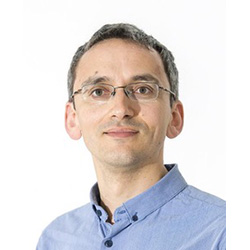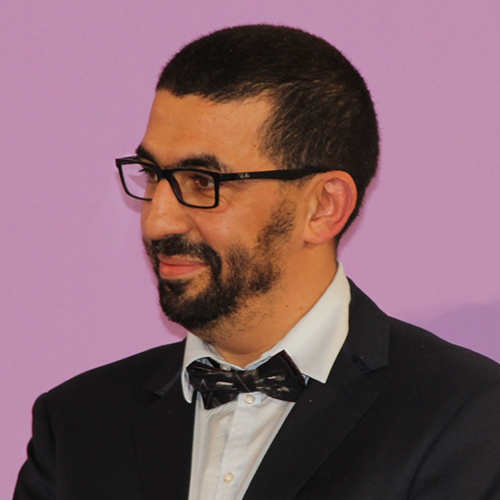Les départements
![]() Signalisation et Chromatine
Signalisation et Chromatine
Les projets de recherche développés dans ce département considèrent le flux d'informations vers et à partir du génome. Notre ultime ambition est de faire des avancées conceptuelles dans la compréhension des mécanismes moléculaires, cellulaires et systémiques par lesquels le génome coordonne sa fonction avec diverses activités cellulaires et avec son environnement.
Nous développons des projets innovants basés sur l'hypothèse que des pathologies surviennent en conséquence de la perturbation ou de la modification des communications entre le génome et son environnement cellulaire ou extracellulaire, et ces travaux conduisent à des innovations impactant la détection et le traitement des maladies.
Ces projets présentent un équilibre entre concepts et modèles expérimentaux. Ils comprennent différentes approches qui déclinent des aspects différents mais connectés de biologie de la chromatine, par exemple en étudiant la relation entre la structure / dynamique du chromosome dans divers contextes physiologiques et pathologiques et dans différents organismes modèles. Les programmes de recherche présentent une combinaison unique de recherche fondamentale et de recherche translationnelle avec des applications cliniques et industrielles directes.
![]() Microenvironnement, Plasticité cellulaire et Signalisation
Microenvironnement, Plasticité cellulaire et Signalisation
Nos programmes de recherche sont dédiés à l'étude des principes fondamentaux de la vie et des maladies, le développement de nouvelles thérapies et de nouvelles technologies pour le traitement du cancer et des maladies chroniques.
Le département Microenvironnement, Plasticité cellulaire et Signalisation étudie les mécanismes moléculaires par lesquels le microenvironnement module la forme cellulaire et le destin des cellules pour relever certains des plus grands défis de la science biomédicale. Nous étudions comment les propriétés biochimiques et biophysiques de l'environnement modifient le comportement des cellules à travers la coopération entre les récepteurs, la coordination de réseau de signalisation, l'organisation du cytosquelette et la reprogrammation génétique et épigénétique in vitro et in vivo. Nous combinons différents modèles tels que les monocouches en 2 D et 3 D, des modèles de culture organotypiques, xénogreffe / des modèles de souris transgéniques et des spécimens cliniques, mais aussi des approches interdisciplinaires comme la physique, la chimie et les mathématiques permettant une grande analyse des données.
Notre département multidisciplinaire collabore avec des physiciens, des chimistes et des cliniciens à traduire les avancées moléculaires dans le cancer et les traitements des maladies chroniques.
![]() Environnement, Reproduction, Infections, Cancer
Environnement, Reproduction, Infections, Cancer
Les approches de prévention et de thérapeutique sont nécessaires au maintien et à l’amélioration de la santé des populations. C’est la conjonction des efforts faits dans ces deux domaines qui a permis la transition épidémiologique survenue au cours des siècles passés dans les pays industrialisés. Ceci est une réalité pour l’action publique dans le domaine de la santé, et la recherche biomédicale concerne aussi ces deux dimensions.
La finalité des travaux menés dans le Département Prévention et Thérapie des Maladies Chroniques est d’identifier des facteurs de risques contrôlables, comprendre leur mécanisme d’action et de développer des médicaments et des stratégies de traitement innovantes des maladies chroniques et infectieuses.
Les déterminants des maladies considérés sont des agents infectieux tels que Toxoplasma (responsable de la toxoplasmose), les agents de la malaria, les virus de l’hépatite, des facteurs physico-chimiques tels que les polluants atmosphériques, les nanoparticules et des perturbateurs endocriniens et la réponse de l’hôte à ces agents.
Dans le champ de la thérapeutique, nous cherchons à identifier des facteurs de risques pronostiques dans le champ du cancer et à développer et valider des thérapies, en particulier des immunothérapies. Les connaissances mécanistiques générées par notre département concernent les interactions hôte-pathogène, les effets des facteurs infectieux et environnementaux sur le remodelage de la chromatine et d’autres marques épigénétiques, la signalisation cellulaire via les interactions entre p53 et LKB1.

 Signalisation et Chromatine
Signalisation et Chromatine
 Microenvironnement, Plasticité cellulaire et Signalisation
Microenvironnement, Plasticité cellulaire et Signalisation
 Environnement, Reproduction, Infections, Cancer
Environnement, Reproduction, Infections, Cancer